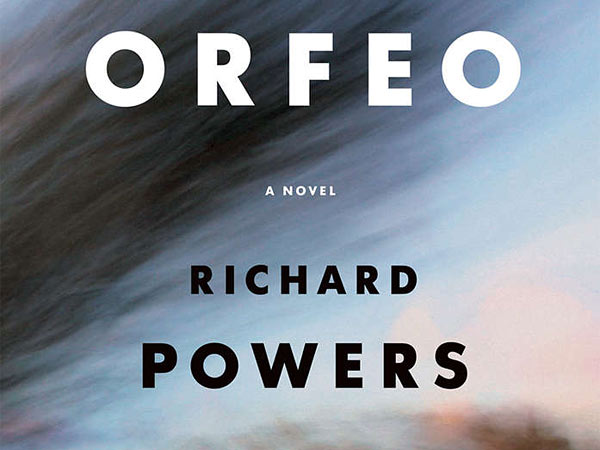Book Review: Richard Powers’s Urgent “Orfeo” — Can Art Save Us?
As with any Richard Powers novel, when you finish “Orfeo” you will have no doubt you are alive, awake, and likely ready to start over at page one.
Orfeo: A Novel, by Richard Powers. W. W. Norton & Company, 384 pages, $26.95.
By Eric Grunwald
A lot of music in the world, Peter Els, the protagonist of Richard Powers’s new novel, tells a police officer who is poking around Els’s house. True, that, responds the officer. A lot of everything. Indeed, and Powers has repeatedly shown not only that he knows a great deal of it, but that he can also wield it to brilliant effect in his fiction. His 2006 National Book Award-winning The Echo Maker explored the dilemma of brain versus mind versus heart, and 2009’s arguably even better Generosity: An Enhancement delved into the genetics of happiness — not to mention writing, psychology, the modern media, and the Net. In critiquing Jonathan Franzen’s The Corrections years ago critic James Woods pointed out that the duty of a novel is to show how people feel, not, as Franzen had largely done, to try and capture snapshot-style the complexity of national life at a particular moment. Powers typically carries off both, forging his knowledge of literature, science and technology into crackling, compelling admixtures of character, fact, feeling, and observation.
In his new Orfeo, which according to the press release “modernizes the myth of Orpheus,” Powers returns to the base pair of music and biology, which he explored to great effect in 1997’s The Gold Bug Variations. Here, however, the protagonist is not 30 but 70 and he is not an observer but a creator. Orfeo revolves around Peter Els, a retired and arguably failed composer who, upon the sudden death of his music-loving dog, comes to the attention of authorities for his substantial home bioengineering lab. Soon Els is on the lam as a national terrorist suspect, and we indeed want to know what he was up to and what will happen.
The key moment of Orpheus’s tragedy, however, is breaking a promise and looking back. Between occasional episodes in Els’s flight, which includes alarming clues about what he was doing with the bacteria, most of the book explores the man’s career as a composer and a lover — not surprisingly the two are intertwined. The flash backs include glimpses at Els’s not always successful navigation of the academic politics sparked by questions of what music should be: what is reactionary, what is fresh, what is good. Add to that detailed descriptions of the trajectories of musical works both real and fictitious — not without significance but requiring patience from the reader — and you have a novel that proceeds at a slower pace than Powers’s recent books. Complicating things are chapter divisions provided by short excerpts from some kind of future explanatory tract, presumably Els’s: “Once, I’d hoped to make thousands of runaway pieces. They failed to run away. This one did. It’s all around you now, in the billions.” Whether these are excerpts from trial testimony or a Unabomber-style manifesto is part of the novel’s suspense. Toss in dialogue that is indicated merely by italics, and you have book that strives for a distant, even mournful, tone, as though Orfeo is indeed bubbling up to us from the Underworld.
Rest assured, there is always method to Powers’s madnesses (structures that some reviewers of Orfeo have already glibly ignored). Powers uses the myth of Orpheus to speculate about the meaning of music and, by extension, writing in today’s world: what they are for and whether a life spent creating them, sometimes at the expense of all else, is worth it. One of Powers’s great strengths is “negative capability,” what John Keats termed the ability, possessed in spades by William Shakespeare, to entertain all points of view in a conflict without taking sides. Answers are not sought; the goal is a provocative farrago of ideas and perspectives. This dramatizing facility allows Powers (and his characters) to ask difficult questions and arrive at a number of different conclusions. At one point, for example, Els concludes that “music doesn’t mean things. It is things.”
Given the book’s central metaphor, the biggest question here is whether art can bring us back from the dead, either in its enjoyment or in its composition. Indeed, Els searches for a variety of ways to revivify himself: classical music, his marriage, the admiration of an audience. But can the composer resurrect himself yet at the same time be free to make new work, free from the pressuring confines not only of human relationships but also from the responses of listeners? “So long as no one listens,” Els thinks at one point, “you’re better than safe. You’re free.”
Indeed, freedom is a key theme here, not only in the creative sense but also the political. Thus the hysterical reaction of the terrorized, traumatized country and the modern surveillance state to Els’s activities: the Fahrenheit 451-style manhunt blares from all media orifices. Are we still free? Are we alive, even? And can music — and the arts — save us? Els realizes at one point that “the problem” with music is that every piece, sung or instrumental, tells a tale, even when there is no tale to tell. Powers is writing a narrative, so he is clearly asking such questions of himself. Whence the impetus for the telling of tales, and what is it good for? To delight, as Els says more than once, but what else can it do? Indeed what must it do in our age of volubility run amok?
What do stories have to teach us? Orfeo retells tales within musical works as well as those surrounding their genesis: the fiery life and death of a 15th-century millenarian, Shostakovich’s struggles with Stalin, the incineration of women and children at Waco. Powers’s answer appears to be that the writer must try to raise from the dead those people and ideas that are most necessary to us, our collective Eurydices.
In a more immediate sense, though, we readers are Eurydice here, and even if this novel does not carry us constantly on the raging rapids we’ve come to expect from Powers, even if we must occasionally keep our ear to the ground to follow this quest, Powers’s inherently sharp and urgent drive is always lurking. Moreover, as the noose tightens around Els, the novel does rapidly pick up speed and spouts us tumbling back into the 21st century, into a plot and finale that could not be any more concrete and contemporary. Moreover, the wrap-up features a couple of twists and turns that will continue to solidify Powers’s reputation as one of our most ingenious and invaluable writers.
You may not understand it all — several sentences, probably too many, are abstract to the point of the cryptic (e.g., “A grammar but no dictionary, sense but no meaning, urgency without need: music and the chemistry of cells.”). But as with any Powers novel, when you finish Orfeo you will have no doubt you are alive, awake, and likely ready to start over at page one.
Eric Grunwald is former managing editor of Agni and now teaches at MIT. He is at work on a novel.


